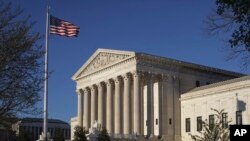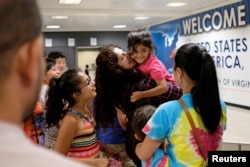The U.S. Justice Department is expected to appeal the latest travel ban court ruling to the Supreme Court.
According to a Justice Department official, the agency plans to ask the high court to weigh in on an appeals court ruling that says grandparents and cousins are close enough relatives to constitute an exemption from the Trump administration's travel order. The court also said that refugees accepted by a resettlement agency should be allowed to travel to the United States.
“The Supreme Court has stepped in to correct these lower courts before, and we will now return to the Supreme Court to vindicate the executive branch’s duty to protect the nation," a Justice Department spokesperson told reporters.
The statement comes after Thursday’s ruling by a three-judge panel of the Ninth Circuit Court of Appeals.
President Donald Trump’s travel order restricts travelers from six Muslim-majority countries: Iran, Libya, Somalia, Sudan, Syria and Yemen.
‘Bona fide’ relationships
The Supreme Court said in a June provisional decision that travel restrictions could not be applied to people who have a "bona fide" relationship to the U.S. The high court, however, did not clarify that definition, which was then left open for interpretation.
Although the high court will hear the full case in October, the federal government has interpreted "bona fide" narrowly to mean parents, spouses and siblings, excluding other relatives including grandparents.
The list was then expanded by a judge in Honolulu, Hawaii.
"Common sense, for instance, dictates that close family members be defined to include grandparents," U.S. District Court Judge Derrick Watson wrote. "Indeed, grandparents are the epitome of close family members. The government's definition excludes them. That simply cannot be."
Watson's ruling was subsequently appealed to the Supreme Court, which allowed relatives including grandparents to continue coming to the U.S., pending a ruling from the Ninth Circuit. Refugees whose sole connection to the U.S. was through a re-settlement agency were barred until the appeals court ruled.
Refugees
VOA reported in early September that refugee admissions have dropped dramatically since the travel order took effect June 26.
In July, 1,224 refugees were admitted. In August, 910 refugees arrived in the U.S., compared to an average of 6,955 in that month over the previous 10 years.
The travel order restricts refugee admissions to 55,000. Before he left office, President Barack Obama had raised the limit to 110,000.
In the next few weeks, President Trump will determine the refugee level for fiscal year 2018, which begins October 1. His decision will help government agencies and nonprofits plan ahead to help resettle refugees.
Meanwhile, a State Department official told VOA that two cost studies the president called for in March, under his Presidential Memorandum relating to the U.S. Refugee Admissions Program, or USRAP, are nearing completion.
“As the president requested, the reports will look at the estimated long-term costs of the USRAP at the federal, state, and local levels along with recommendations about how to curtail those costs, as well as how many refugees are being supported in countries of first asylum and those associated costs,” the official said.
The federal official said the State Department is working with the Departments of Homeland Security and Health and Human Services on these reports.
“We are not able to characterize the reports before they are finished,” the official said.





